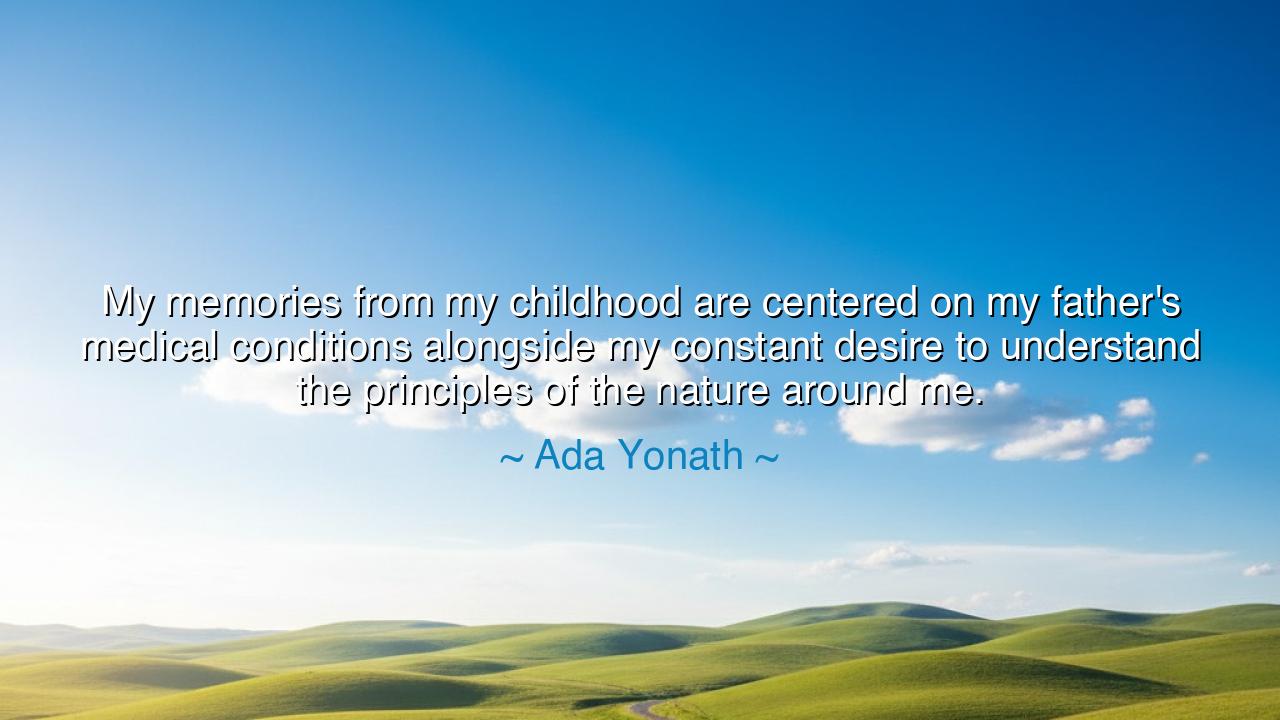
My memories from my childhood are centered on my father's medical
My memories from my childhood are centered on my father's medical conditions alongside my constant desire to understand the principles of the nature around me.






“My memories from my childhood are centered on my father's medical conditions alongside my constant desire to understand the principles of the nature around me.” Thus spoke Ada Yonath, a seeker of truth whose mind pierced the unseen foundations of life itself. Her words are not merely the recollections of a scientist, but the echo of a soul shaped by suffering, wonder, and unyielding curiosity. Within them lies the eternal tension between pain and discovery — for it is often through hardship that the spirit awakens to its destiny. From the shadow of her father’s illness arose the light of her pursuit: to understand the mysteries of nature and through understanding, to heal.
In the ancient world, philosophers said that knowledge is born of both grief and awe. Ada’s early years, marked by her father’s frailty, taught her to behold the fragility of the human body — that sacred vessel which holds the flame of life. Yet even as sorrow brushed against her heart, another force stirred within her: the insatiable desire to know. The child who watched her father’s suffering did not retreat into despair; she turned her gaze toward the living world — to the light that glimmers through every leaf, to the order that governs even the smallest cell. Thus, through personal pain, she began to glimpse the grand design of creation.
Such is the paradox of greatness: that from struggle springs wisdom, and from vulnerability, strength. Many before her walked this same path. Marie Curie, who lost her beloved husband Pierre, transformed grief into a relentless quest for discovery, uncovering secrets of matter that would change the course of science forever. Ada Yonath, too, faced hardship not as an obstacle but as a forge. The challenges of her youth became the foundation of her courage, leading her to the study of the ribosome, the tiny engine of life itself — a mystery that would one day earn her the highest honor of humankind, the Nobel Prize. Yet even in triumph, she remained humble, ever the child who once sought to understand why her father suffered, and how life sustains itself.
There is a sacred thread that ties compassion to curiosity. Those who have known pain often seek knowledge not for glory, but for healing. The young Ada’s empathy for her father became the soil from which her scientific passion grew. She saw that every heartbeat, every breath, every flicker of life is governed by laws deeper than the stars themselves. And she resolved to uncover them — not as a conqueror of nature, but as its devoted student. Her journey was long and uncertain, filled with obstacles, but she carried within her the fire of purpose. That fire, born from the sorrow of a daughter, illuminated the world.
Let this truth be known to all who listen: suffering can be a teacher when met with courage and reflection. There are those who crumble beneath its weight, and those who use it to ascend. Ada Yonath chose the latter path. She transformed the ache of her childhood into a lifelong dedication to discovery. She stands among those rare souls who understand that knowledge is not cold or distant — it is an act of love, a way to serve life itself. For to know the principles of nature is to walk closer to the Creator, to the divine intelligence that breathes through all things.
In her story, there is a lesson for the young and for the weary alike. When life wounds you, do not turn from the world — look deeper into it. When loss surrounds you, let curiosity be your lantern. Seek to understand what moves the stars, what shapes the seed, what gives breath to the living. The universe hides its wisdom not to punish, but to invite. Each question asked with sincerity is a prayer, and each discovery a small redemption.
So remember, children of tomorrow: the road to understanding often begins in sorrow, but ends in light. Like Ada Yonath, let your pain awaken your purpose. Let your compassion lead you to knowledge, and your knowledge to healing. For the true scholar is one who studies not for pride, but for love — love of life, love of truth, and love of those who suffer. In this way, even the quiet memory of a father’s illness can give birth to a discovery that heals nations and honors the sanctity of creation itself.






AAdministratorAdministrator
Welcome, honored guests. Please leave a comment, we will respond soon